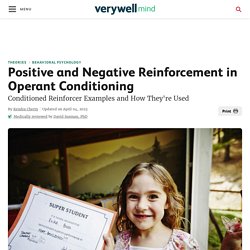

Operant Conditioning. Image 1. Operant Conditioning (B.F. Skinner) How Reinforcement and Punishment Modify Behavior Operant conditioning, also known as instrumental conditioning, is a method of learning normally attributed to B.F. Skinner, where the consequences of a response determine the probability of it being repeated. Through operant conditioning behavior which is reinforced (rewarded) will likely be repeated, and behavior which is punished will occur less frequently. By the 1920s, John B. Reinforcement and punishment.wmv.
What Is Reinforcement in Operant Conditioning? One of the many different ways in which people can learn is through a process known as operant conditioning (also known as instrumental conditioning).1 This involves learning through reinforcement or punishment.

The type of reinforcement used can play an important role in how quickly a behavior is learned and the overall strength of the resulting response. Understanding Reinforcement Reinforcement is a term used in operant conditioning to refer to anything that increases the likelihood that a response will occur. Reinforcements - Positive and Negative. Teens May Learn Best with Positive Reinforcement. A new study finds that adolescents focus on rewards and are less able to learn to avoid punishment or consider the consequences of alternative actions.

University College-London investigators compared how adolescents and adults learn to make choices based on the available information. Investigators tracked the way in which 18 volunteers aged 12-17 and 20 volunteers aged 18-32 completed tasks in which they had to choose between abstract symbols. Each symbol was consistently associated with a fixed chance of a reward, punishment, or no outcome. The value of reinforcing positive behaviour for our teens. As children approach adolescence, they sometimes begin testing limits, bending the rules and otherwise going against the grain.

While this is normal behaviour for teens, it can be incredibly trying for you, as a parent. Teenagers may also be dealing with the stresses that come with trying to fit in with their peers and assert their growing independence. However, at the same time, they are looking for validation from the adults around them. Punishments. A summary of Positive Negative Punishment. Cons of Punishments. Horrible Ways Parents Used To Punish Kids. Discipline strategies for teenagers. Teenage discipline: the basics Discipline isn’t about punishment.

It’s about teaching children appropriate ways to behave. For teenagers, discipline is about agreeing on and setting appropriate limits and helping them behave within those limits. When your child was younger, you probably used a range of discipline strategies to teach him the basics of good behaviour. Teenagers: 20 tips for good behaviour. 1.

Take time to actively listen Actively listening means paying close attention to what your child is saying and feeling, rather than thinking of what you want to say next. This shows your child that you care and that you’re interested. Parenting Teens: When It Comes To Learning, Positive Reinforcement Trumps Punishment.
Teens generally aren’t afraid to defy authority.

Generations of parents know this, having tried different strategies for getting their adolescents to do what they ask — often in attempts to keep them safe and help pave a path toward success. Now, a new study shows that rewards, rather than punishments, could be the way to get them to cooperate. So... reinforcements or punishments? Rewards and Punishment. Thank you for exploring!